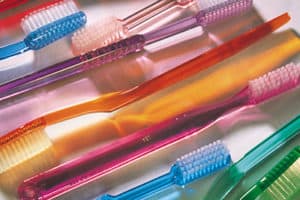Importance of Teaching Children Oral Hygiene
Before they even talk, infants learn that their teeth affect the comfort and condition of their gums. Even normally happy babies cry when they are teething.
However, children quickly learn to enjoy new flavors and textures when their teeth erupt. In addition to expanding babies’ palates, their teeth influence the way others perceive them.
As children age, a bright smile gives them confidence and makes them appear welcoming to others. Thus, it’s important for parents to implement kids dental care procedures when children are too young to care for their own teeth. Later, parents can focus on teaching dental health habits that kids can do by themselves. As they mature, they can practice these dental tips for kids to enhance the health of their teeth.
Promoting Kids Healthy Teeth Before They Can Brush and Floss Themselves
Once your infant is born, you should immediately start to care for their gums since saliva is filled with bacteria. Use a soft piece of damp gauze or cloth to wipe your infant’s gums after they eat and before they sleep.
When you notice your child’s first tooth, start brushing with a drop of non-fluoridated toothpaste. Using a small, soft children’s toothbrush will make it easy to brush kids’ teeth. Small, circular motions help maximize cleaning.
As your kids get additional teeth, gradually introduce flossing. Be careful not to pull the floss hard against your children’s gums, and use a gentle back and forth motion to loosen debris. Recognize that your children’s gums might bleed; tell them to raise a hand if they become uncomfortable.
Early Dental Visits Facilitate Good Dental Health for Kids
Baby teeth are not only your child’s initial set of teeth; they are also saving places for their adult teeth. Taking your child to the dentist between the ages of six months and a year ensures that their teeth are growing properly and makes your child less anxious about dental visits in the future.
Most dentists, including Dr. David Evans of Boulder, CO, can show you brushing and flossing techniques to enhance your ability to provide kids dental care at home. Dental practices should also remind you of important tips like avoiding giving your young child juice or sweet substances that promote plaque.
Regular dental visits can also alert you to other conditions your child may have that could be linked to oral health problems. Make sure your dentist uses new non-metallic fillings when problems like cavities do occur with your child’s teeth.
When children become slightly older and are able to expectorate toothpaste and not swallow it, parents can introduce them to fluoridated toothpaste and children can learn about brushing teeth by using a model of teeth at the dentist’s office. Bring them to the dentist twice a year for teeth cleaning, health checks and a review of dental tips for children that they can do at home. Your dentist can also advise you whether your local water supply contains fluoride and prescribe fluoride vitamins that help prevent decay.
At-home Dental Health for Kids: Observing Parents
Children enjoy activities that make them feel grown up. In addition to caring for your child’s teeth, let them watch your dental regimen. Here are a few fun ideas:
- Create morning and bedtime routines that include adults and kids brushing teeth together.
- Have contests with them. Your children may enjoy contests like who can create more bubbles when they brush or who can spit toothpaste suds closer to the drain.
- Let your child watch you floss, and then floss their teeth.
- Allow them to practice flossing on plastic teeth.
- Your child may enjoy swishing water in their mouth and spitting it out after meals.
Practice healthy eating habits in front of your child. Sugary sweets cause plaque, so limiting junk food in your home will help you and your children make wise choices. Yogurt, milk and nuts are some foods that promote healthy teeth.
Fun Ways Parents Can Help Their Children Form Good Dental Habits
Teaching children about kids dental health can be more fun when siblings help parents teach good dental habits. If your child has a brother or sister who already knows about dental tips for kids, let your older child help educate your younger one. A younger child can become interested in teeth care when they watch their older sibling do it.
Put a chart on the bathroom wall, and let your child put stars on it when he brushes and flosses his teeth. Look at your child’s teeth after they floss and brush. Do not forget to give them praise when they teeth look clean.
Although parents should check that toothpaste contains fluoride when the child is able to expectorate properly, giving your child a choice of toothpaste flavors or letting them choose a special toothbrush can make dental health for kids more fun. Some toothbrushes have favorite cartoon characters or come in vibrant colors and patterns. Other toothbrushes play music that encourage children to brush for a full two minutes. If desired, when your child develops music preferences, you can let them choose a song to play when they brush.
Dental tips for children are great for your kids to learn at a young age so they can have sparkling, healthy teeth that can last a lifetime. Practicing routine dental health for kids, monitoring your children’s dental hygiene, praising their efforts and visiting Dr. Evans dentistry every six months can help develop exceptional dental health for kids.


